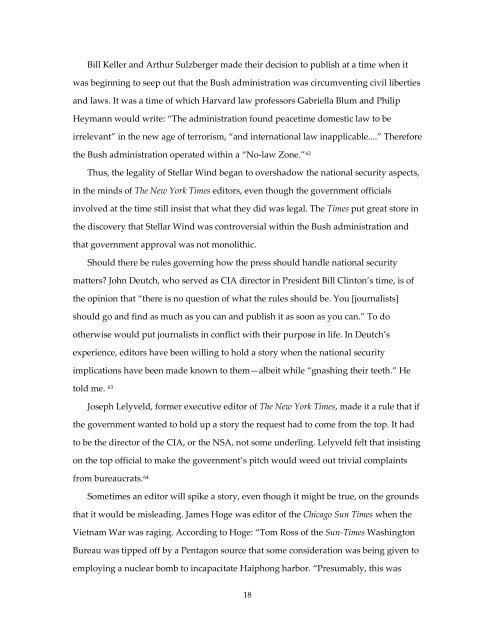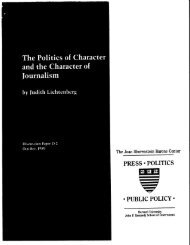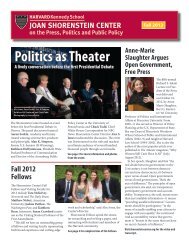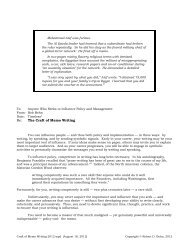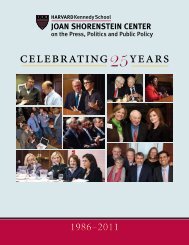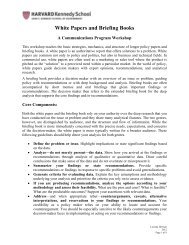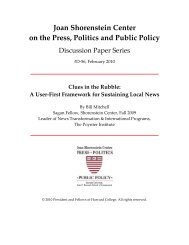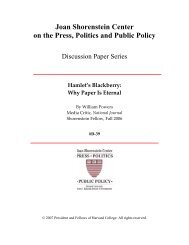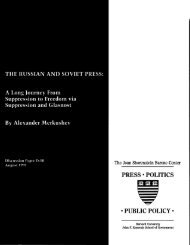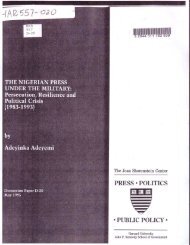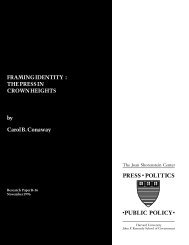Anatomy of a Secret - Harvard Kennedy School
Anatomy of a Secret - Harvard Kennedy School
Anatomy of a Secret - Harvard Kennedy School
You also want an ePaper? Increase the reach of your titles
YUMPU automatically turns print PDFs into web optimized ePapers that Google loves.
Bill Keller and Arthur Sulzberger made their decision to publish at a time when it<br />
was beginning to seep out that the Bush administration was circumventing civil liberties<br />
and laws. It was a time <strong>of</strong> which <strong>Harvard</strong> law pr<strong>of</strong>essors Gabriella Blum and Philip<br />
Heymann would write: “The administration found peacetime domestic law to be<br />
irrelevant” in the new age <strong>of</strong> terrorism, “and international law inapplicable....” Therefore<br />
the Bush administration operated within a “No-law Zone.” 62<br />
Thus, the legality <strong>of</strong> Stellar Wind began to overshadow the national security aspects,<br />
in the minds <strong>of</strong> The New York Times editors, even though the government <strong>of</strong>ficials<br />
involved at the time still insist that what they did was legal. The Times put great store in<br />
the discovery that Stellar Wind was controversial within the Bush administration and<br />
that government approval was not monolithic.<br />
Should there be rules governing how the press should handle national security<br />
matters? John Deutch, who served as CIA director in President Bill Clinton’s time, is <strong>of</strong><br />
the opinion that “there is no question <strong>of</strong> what the rules should be. You [journalists]<br />
should go and find as much as you can and publish it as soon as you can.” To do<br />
otherwise would put journalists in conflict with their purpose in life. In Deutch’s<br />
experience, editors have been willing to hold a story when the national security<br />
implications have been made known to them—albeit while “gnashing their teeth.” He<br />
told me. 63<br />
Joseph Lelyveld, former executive editor <strong>of</strong> The New York Times, made it a rule that if<br />
the government wanted to hold up a story the request had to come from the top. It had<br />
to be the director <strong>of</strong> the CIA, or the NSA, not some underling. Lelyveld felt that insisting<br />
on the top <strong>of</strong>ficial to make the government’s pitch would weed out trivial complaints<br />
from bureaucrats. 64<br />
Sometimes an editor will spike a story, even though it might be true, on the grounds<br />
that it would be misleading. James Hoge was editor <strong>of</strong> the Chicago Sun Times when the<br />
Vietnam War was raging. According to Hoge: “Tom Ross <strong>of</strong> the Sun-Times Washington<br />
Bureau was tipped <strong>of</strong>f by a Pentagon source that some consideration was being given to<br />
employing a nuclear bomb to incapacitate Haiphong harbor. “Presumably, this was<br />
18


